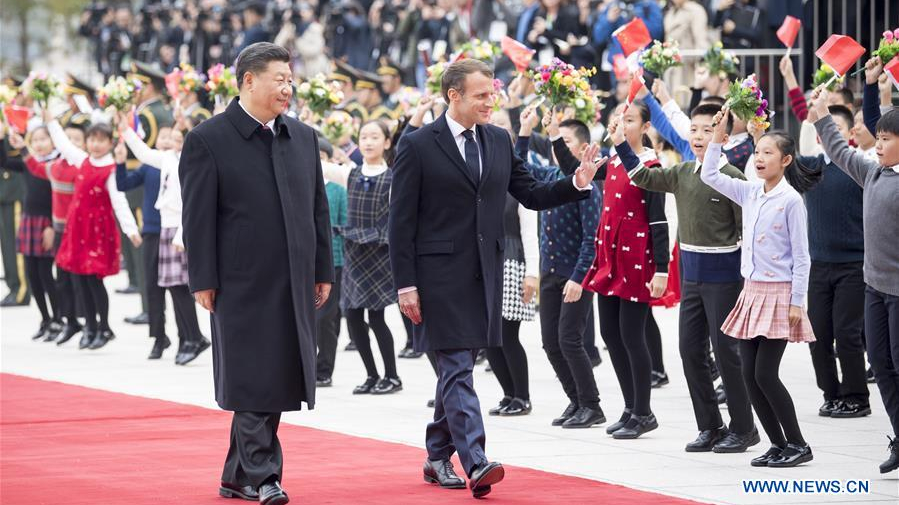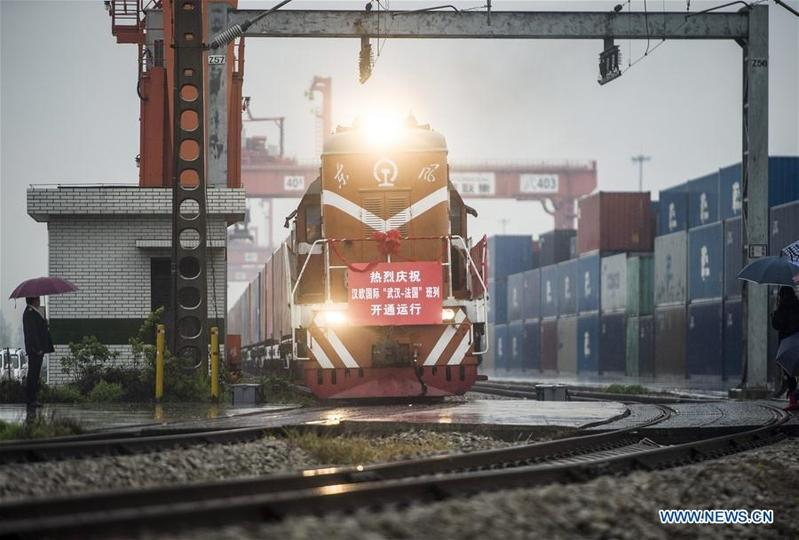
Chinese President Xi Jinping holds a welcome ceremony for French President Emmanuel Macron before their talks in Beijing, capital of China, November 6, 2019. /Xinhua Photo
Chinese President Xi Jinping holds a welcome ceremony for French President Emmanuel Macron before their talks in Beijing, capital of China, November 6, 2019. /Xinhua Photo
Editor's Note: Tom Fowdy is a British political and international relations analyst and a graduate of Durham and Oxford universities. He writes on topics pertaining to China, the DPRK, Britain, and the United States. The article reflects the author's opinions, and not necessarily the views of CGTN.
In the midst of the China International Import Expo (CIIE) , Chinese President Xi Jinping and his French counterpart Emmanuel Macron penned up to 15 billion U.S dollar worth of deals in aeronautics, agriculture, energy and livestock. During their summit, Memorandums of Understanding were also signed with the view to technological cooperation on gas storage projects in north China's Tianjin Municipality, as well as the formation of a joint venture to distribute liquefied natural gas in the Yangtze River delta including the provinces of Zhejiang and Jiangsu, and Shanghai Municipality.
Commenting on the deals, Macron stated that "developing market access and partnerships between our companies is a priority," and further noted that the two countries "share the same feeling that trade war only results in losers". Given this, the meeting and the broader expo prove a meaningful step forwards for China-EU ties, with Xi Jinping having placed emphasis on Beijing's commitment to greater market openness and business opportunities in line with already shifting policies.
Although many in Washington have hoped that the European Union will eventually "turn against" China in the same way they have, the Xi-Macron meeting is a reminder that the continent will continue to engage with Beijing on a pragmatic and productive level, with business between the two parties continuing to grow irreversibly. Thus, there is certainly a movement towards establishing a more coordinated and defined "European interest" in relations with Beijing, and there are many opportunities ahead.

A freight train arrives in Lyon, France from Wuhan, central China's Hubei province, on March 26, 2019. /Xinhua Photo
A freight train arrives in Lyon, France from Wuhan, central China's Hubei province, on March 26, 2019. /Xinhua Photo
European Union countries, although not without variation, at large all see inherent value in expanding trade and commercial ties with China. Whilst sometimes there are ideological differences at play, there is clear evidence that Europe does not see its relationship with China as a zero-sum game or struggle in the way in which the United States has done. European leaders such as Macron see Washington's stance as counterproductive, destabilizing and self-destructive. For Europe, it is possible to have disagreements with China, while pursuing a stable, beneficial and cooperative relationship on a multilateral stage.
On the commercial level, the continent simply cannot afford to negate Beijing or push them out of the picture. In the recent years, economic growth in the eurozone has been fragile and underwhelming at best, with the continent's current performance being undermined by crises such as Brexit and a growing trade dispute across the Atlantic with the United States, whom recently imposed tariffs on a range of EU exports. In addition, the disruption posed by Washington's trade war against China and the toll it has taken on global growth has also accelerated a push for the region to expand its commercial ties.
As a result, Macron, as one of the EU's most prominent leaders, has sought to place paramount importance on expanding economic ties with China and also looking to better secure the continent's interests within the country, particularly in terms of greater investment opportunities and market access. His attendance at the China International Import Expo was a symbolic statement in this regard; the French president also wants to see a greater level of European participation in China's massive domestic market. He came to China with an eye for business.
In view of this, China is also prepared to make significant effort to strengthen its ties with the European Union and accommodate their positions. In responding to the American trade war, Beijing has sought to consolidate its free trade and business ties with a number of other countries and regions, as well as committing its markets and economy to greater openness. Idealistically, in the long term, progress between China and the Europe should lead towards the negotiation of a free trade agreement between them.
Given this, there are many reasons to be positive about China-Europe ties, with progress made this week proving to be a significant milestone. Although some have hoped for ties to worsen, in the long run, it will be a relationship which whilst complex owing to the number of actors involved, will continue to remain stable, productive and beneficial. China-Europe business ties will also continue to grow. Ironically, Washington's trade wars have acted as a catalyst in pushing other countries towards cooperating without the U.S., as Trump alienates the world and others unite together.
(If you want to contribute and have specific expertise, please contact us at opinions@cgtn.com.)